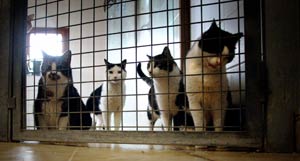Friday, March 10, 2006

increase of strays (Jean-Philippe Ksiazek/AFP/Getty Images)
The Times March 09, 2006
Flu panic hits cats, dogs - and Disney
From Adam Sage in Paris
Disneyland Paris was accused yesterday of hiding a dead swan as panic over bird flu spread across Europe. The allegations, angrily denied by the resort, were made by trade unions who said managers had hushed up the discovery to avoid scaring off visitors. The row came amid what experts are describing as an avian flu psychosis after the arrival of the H5N1 virus.
In France, police officers have been sent to shoot wild ducks, the fire service has been inundated with requests to pick up dead pigeons, and cockerels banned from fighting are allegedly expiring from apoplexy. The scare reached Disneyland when two unions, the French Democratic Workers Confederation and Workers’ Force, said staff has seen a dead swan in the adventure park.
Although there was no suggestion the swan had fallen victim to bird flu — or even proof that it had actually existed — the report featured prominently on the radio news. The resort, which attracts 12 million visitors a year, denounced the claims as “unacceptable lies.” A spokesman said the only birds found dead on the site were a sparrow and pigeon, which had succumbed to natural causes. Disneyland accused unions of making up the swan scare story to put pressure on management during wage negotiations.
The confirmation yesterday of two new cases of bird flu in cats on the German Baltic Sea Island of Rügen provoked fresh concerns from animal welfare societies. Hundreds of cats have been abandoned in France and Germany over the past two weeks. “A lot of owners pretend they have suddenly developed an allergy to cat fur,” a worker at the French Society for the Protection of Animals said.
In Marseilles riot police sealed off an industrial estate where a dead swan with the H5N1 virus was found last weekend. Pet owners near by were told to keep cats indoors and dogs on a lead. Anne-Marie Pigache, a council worker in nearby Saint Mitre, said 30 people had asked her to dispose of her backyard chickens. She had refused.
The French poultry industry has lost €130 million (£90 million) as a result of the bird flu scare, with 46 countries banning French fowl and foie gras and a 30 per cent slump in domestic sales. One supermarket is now offering a buy-one-get-one-free deal for roast chicken.
Cockerel breeders said they, too, were suffering after the authorities banned fights. Jean Louis Hoyez, president of the French Club of Northern Fighting Cocks, said: “These animals are bred for their aggressiveness, and when they can’t fight, they just die of apoplexy.”
BBC - Online
Russia launches bird vaccinations
Bird receiving a vaccine against avian flu
Friday, 10 March 2006, 12:17 GMT
There have been calls for all fowl across Europe to be vaccinated
Russia has begun the mass vaccination of poultry to try to stop the spread of the lethal H5N1 bird flu virus.
Millions of vaccines have already been delivered to provinces in southern Russia - a region believed to be most vulnerable to the virus. The virus is blamed for nearly a million poultry deaths in Russia. France and the Netherlands have been given permission by the EU to vaccinate fowl against the virus - a policy some experts have criticised as dangerous.
Critics say the vaccine does not offer birds complete protection from the disease and could, in effect, mask its spread among flocks - raising the risk that it could ultimately infect humans. They also point out it is highly expensive. However, many farmers' associations and vets have called for an EU-wide vaccination policy.
Millions of birds and scores of people have died from the H5N1 virus. The virus has so far only infected people who have come into direct contact with diseased fowl - but experts fear a mutant form of the virus may trigger a pandemic among humans.
The mass vaccination of Russian birds has already started in the southern republics of Dagestan and Kabardino-Balkaria, Russian TV reports. The programme is initially focusing on delivering the vaccine to farms that are near ponds and waterways frequented by migratory birds. Officials are quoted as saying the project will be completed by July.
The vaccine is being given free to domestic fowl. Officials in the southern Krasnodar region have warned farmers against criminals who have reportedly been posing as vets and selling fake vaccines. Several governments across Europe have urged farmers to confine their poultry indoors to reduce the risk of infection.
BBC - Online
Cat death prompts bird flu advice
Wednesday, 8 March 2006, 20:38 GMT
A stray cat handed in to an animal shelter in France
Stray cats may help to spread the H5N1 strain of bird flu, experts say
Cat owners in countries hit by bird flu should keep their pets indoors, two agencies involved in co-ordinating the fight against the virus have said. The World Health Organization and the Food and Agriculture Organization's advice follows the death of a domestic cat in Germany of the H5N1 strain.
The death is the European Union's first known case of cross-species infection. Both organisations said that despite the finding, cats were not believed to play a major role in the virus' spread.
Recommendations
The agencies said they were mindful of the potential for flu viruses to mutate into strains lethal to humans or other mammals. The FAO recommendations focus on how to minimise risk in areas where H5N1 has been diagnosed or is suspected among poultry or wild birds.
They include:
* Report unusually high numbers of bird deaths
* Inform local vets of any dead or sick cats
* Keep cats away from wild birds or poultry, keeping them indoors if necessary
* If cats bring sick or dead birds into the house use plastic gloves to put the birds in a plastic bag for collection by vets
* Keep away from stray cats and do not touch sick or dead cats or other animals.
The WHO also advises keeping dogs on leads at all times outside home premises, and not to feed any "water birds". Cats have been known to contract the virus from eating infected birds. Three rare civet cats in Vietnam died of bird flu last August. In October 2004, dozens of tigers died at a private zoo in Thailand after a bird flu outbreak.
Risk
Tests have confirmed that the virus can cause severe illness in domestic cats and can be passed between them.
COMBATING BIRD FLU
Report unusual bird deaths
Report sick or dead cats
Keep cats away from birds or indoors
Avoid stray cats
Keep dogs on leads outdoors
Use gloves to put dead birds in bags
Wash hands frequently
Clean litter trays and feeding dishes regularly
Source: WHO/FAO
Experts believe the dead cat in Germany ate infected poultry, but they point out it is possible animals could contract the disease by inhaling contaminated faeces. While there is no evidence of cat-to-human infection, the authorities acknowledge it is a "small possibility".
An FAO spokesman said: "Humans and other mammals need to come into contact with large amounts of virus to become infected. "And in cases of infection with H5N1, mammals and humans apparently only shed small amounts of virus, contributing to reduced risk of spread among themselves." Officials are urging people to take hygiene precautions including frequent hand-washing with soap and water.
hewitt.mobi Posted at 3:08 pm |
2 comments
Good gravy! The poor kitty cats!
Good to hear from you, yes a bit serious this outbreak of bird flu. Just fingers crossed it does not pass to humans from animals but I'm not hopefull. Anyhow I hope you've survived your bad weather & I'll talk to you soon.
By hewitt.mobi, at
3:35 pm
2 Comments:
We're cat sitting for our neighbors. It's been 3 days so far, 4 more to go. Adorable kitty. And then I see your pic. That Bird Flu is such a pain.
It would be great if it was eradicated!
So, how are things, Charlie? Haven't dropped by in awhile, I know. I've been practicing writing. Taxes the ol' brain something fierce!
Whoops, it's thundering out. Looks like the weathermen were right for a change. I'd better go and turn this thing off. But I had to say HI before I did. Toodles!
Charlie xxx






